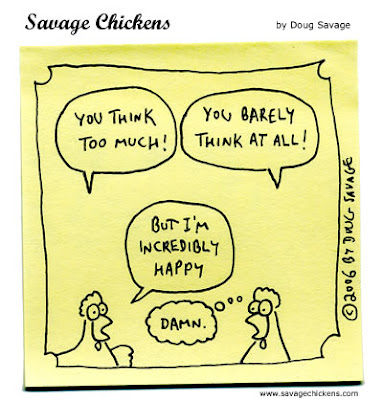 |
| Knowledge Reigns Supreme Over Nearly Everyone |
Sunday, February 26, 2012
An Outlook of a Counterintelligence Program/Stopping Subliminal Ignorance
Friday, February 3, 2012
Some People Say

Original Date Written: July 18, 2011
A lot of people say I tend to overthink... that I think too much. They also say that this leads to my fear and nervousness. This is a message to them.
Everyone has ideas. Everyone has opinions. Some are formed and won't change… some are formed and will change… and some aren't formed at all. With that said, these opinions are formed through words, as it is the common way people think about when they "communicate". Words that have the same meaning have different meanings. To some people, "bad" means "good". To some people, "fine" means "not fine". To some people, "stupid" means "wonderful". Having the full understanding of the English language is probably the hardest thing to tackle; well, that… and trying to grasp the concept of "true love"… but that's another story.
A lot of people say, "Sticks and stones may break my bones… but words will never hurt me." It's quite ironic that the saying is only said when someone's true emotions are expressed in an aggressive, sad, or pessimistic manner. It's important to acknowledge that words have more meaning than people think. Why else would people say, "Things are better to be left unsaid."? Because words hurt. Why is it encouraged to say encouraging words to the discouraged? Because words heal. There is a quote by Siddhartha Gotoma which holds true: "Whatever words we utter should be chosen with care for people will hear them and be influenced by them for good or ill."
Some say tomay-to… others say tomah-to
Some say soccer… others say football
Some say bang… others say make love
Some say bitch… others say lady
When one says hoe… another person may think of a gardening tool.
When one says gay… another person may think that he's happy.
When one says douchebag… another person may think of hygienic equipment.
When one says molest… another person may think about annoyance.
On that note… this is why I hesitate and/or take time when I use my words: because I want everything to be said perfectly. However, over the years, I've come to realize that there's no such thing as perfect. Regardless of whether or not my sentences are perfect, people are going to think the way they're going to think. What I attempt to do with my words is make people see things from my perspective… and that is all.
Furthermore, I think that having a voice and using it is one of the greatest gifts God has given us. Just as he gave us lungs to breathe, a brain to think, and a heart for our whole bodies to function, take advantage of your larynx (combined with your lungs, brain, and heart) and use your voice to its full potential. Don’t just say the ordinary: come up with your own way of saying things.
To give an example, there's a girl I'd like to think I know quite well… although I'm not sure yet. A lot of people think they know who she really is (including myself), but it wasn't until a few weeks ago when I found out how underappreciated she was as a person.
Some say she's weird… I say she's unique.
Some say she's smart… I say she's intelligent.
Some say she's funny… I say she's hilarious.
Some say she's cute… I say she's endearing.
Some say she's hot… I say she's beautiful.
Some say she's deep… I say she's profound.
Some say she's dreaming… I say she's coming to reality.
Use your words wisely, y'all.
"Don't forget to forgive, but don't forgive to forget." (Something I always say)Thursday, February 2, 2012
Introduction: Old Enough (18)
Anyways, because I have nothing, I'm going to show you a piece that I wrote last summer (July 27th, 2011), dedicated to my sister who (at the time) was about to turn 18.
-------------------------------------------------------------------------------
Today's just an ordinary day… and tomorrow will be, as well. I'm still going to wake up groggier than a man hanging over from another good time. I'm still going to start my day by looking at a man in the mirror preceding a masterful throw of warm water on my face that is so refreshing, I don't even want to go back to bed. Before opening my door to beams of sunlight and head downstairs to my dining room table where a laptop awaits me with a cluster of emails, I indirectly think about how I'm going to prepare myself to the best of my ability for anything that comes across my path… and, of course, think to myself: "What a wonderful world!"
Sometimes, I think about my days of yore, and how long ago 'twas when I was young… or shall I say: younger. 'Twas a score ago when I had been wrought. Okay… I'm not that old, but I must say: I am older… older than I was before I reached a certain age.
When I was seventeen, it was a very good year. It was a very good year for small town girls… and soft summer nights; kind of like this year, and last year, and the one before. It will only be a matter of time when I start talking about when I was twenty-one, living below perfume scented girls whose legs open quicker than the bottle cap popping out of an effervescing Pepsi bottle. It'll only be a matter of time when I will start talking about effervescing champagne bottles.
Turning eighteen is a big deal to many people. In the U.S., you are finally given a taste of the freedom that a typical seventeen-year-old anticipates: marrying an asshole/bitch, divorcing an asshole/bitch, and suing an asshole/bitch. Okay… not exactly what most seventeen-year olds look forward to, but there are other things, too: joining the military, adopting a child, becoming a stripper. No? How about buying lottery tickets or paying taxes? Am I getting any closer? (Well, it's freedom, isn't it?)
In all seriousness, there is all of this freedom that everyone brags about once they turn eighteen. I used to look forward to being in charge of my own bank account, being able to vote, and having the eligibility to shop for porn. Of course, there are the people who completely take advantage of their liberties at this fine age by instilling "artistic" ink into their bodies, buy products bad for their health, and (literally) gamble away their life and end up in prison. However, with all these crazy age laws about what we can legally do, it creates all these ideas in our heads. It makes us think about all of the things we still can't do at eighteen. It makes us think about "aging" at an early age. It takes out all the fun of why people do the (then) illegal things in the first place. Seriously, do you know many middle-aged people or senior citizens who decide to pick up a cigarette and light it if they've never smoked anything in their life?
So… moral of the story: When making decisions as an independent person, live life dangerously while you can. Make life exciting, as life gets too boring eventually. (Coming from the wise and experienced words of a twenty-year-old who has lived out most of his life…)
Bless you all… whether you have sneezed or not.
References:
Papa Roach's "Forever"
Louis Armstrong's "What a Wonderful World"
Frank Sinatra's "It Was a Good Year"
